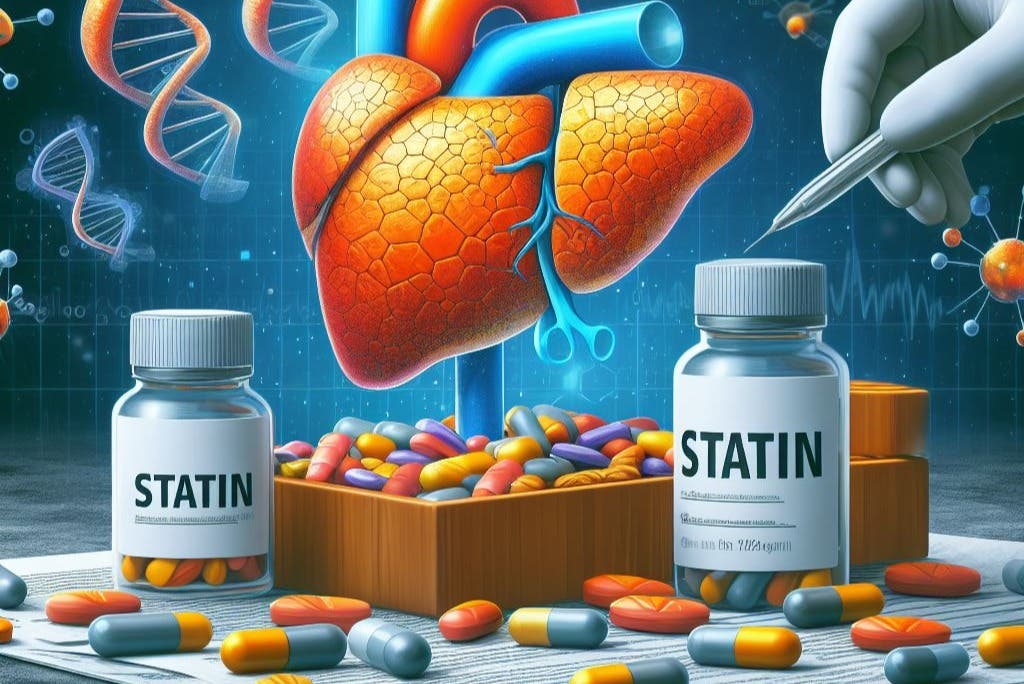Common cholesterol medication can prevent liver cancer, study finds
A potential breakthrough in the fight against liver cancer among patients with chronic viral hepatitis has emerged.

[Jan. 2, 2024: JD Shavit, The Brighter Side of News]
A potential breakthrough in the fight against liver cancer among patients with chronic viral hepatitis has emerged. (CREDIT: Creative Commons)
In a groundbreaking study conducted by researchers at the prestigious Karolinska Institutet in Sweden, a potential breakthrough in the fight against liver cancer among patients with chronic viral hepatitis has emerged.
The findings, published in the esteemed Annals of Internal Medicine, reveal that fat-soluble statins could be the key to preventing liver cancer and reducing mortality rates in this vulnerable patient population.
Chronic viral hepatitis, encompassing hepatitis B and C, is a grave medical condition associated with an elevated risk of developing liver cancer. While medical advances have made it possible to treat hepatitis B and even cure hepatitis C, the critical need for a treatment that can thwart liver cancer in individuals whose livers have suffered damage due to hepatitis remains unmet.
Recent years have witnessed a surge of interest among scientists exploring whether statins, typically prescribed to lower cholesterol levels and prevent cardiovascular disease, could potentially play a crucial role in preventing liver cancer.
Related Stories:
One of the key distinctions among statins is their solubility; they can be classified as either fat-soluble (lipophilic) or water-soluble (hydrophilic). However, the precise impact of this solubility difference on cancer prevention has remained elusive until now.
The groundbreaking study in question involved the identification of over 63,000 patients afflicted with chronic hepatitis B and C. Among this cohort, 8,334 patients were found to be using statins. More specifically, 6,554 patients were prescribed fat-soluble statins such as atorvastatin, simvastatin, fluvastatin, and lovastatin, while 1,780 patients were using water-soluble statins like pravastatin and rosuvastatin.
Over the course of a rigorous 10-year follow-up period, a noteworthy trend emerged. Only 3.3 percent of the patients taking fat-soluble statins developed liver cancer, whereas a significantly higher 8.1 percent of those not using statins succumbed to this devastating disease. Once other confounding factors were factored in, it became clear that fat-soluble statin users experienced a remarkable 44 percent reduction in the risk of developing liver cancer compared to their non-statin-taking counterparts.
Cumulative incidence of HCC in the pooled propensity score–matched cohort (n = 16 668), by lipophilic statin use, hydrophilic statin use, or nonuse. Statin use was defined as ≥30 cDDDs of filled statin prescriptions; nonuse was defined as
Furthermore, patients who relied on fat-soluble statins displayed lower mortality rates after a decade of use, showcasing the potential life-saving benefits of this intervention.
Professor Jonas F. Ludvigsson from the Department of Medical Epidemiology and Biostatistics at the Karolinska Institutet expressed his optimism about the study's findings, stating, "Previous research has indicated that statins may play a role in preventing liver cancer. Now we have confirmed that and shown that it is the fat-soluble statins that have the greatest effect."
Cumulative incidence of all-cause mortality in the pooled propensity score–matched cohort (n = 16 668), by lipophilic statin use, hydrophilic statin use, or nonuse. Statin use was defined as ≥30 cDDDs of filled statin prescriptions; nonuse was defined as
While patients using water-soluble statins did experience a reduction in mortality rates, they did not enjoy a parallel decrease in the incidence of liver cancer. Interestingly, fat-soluble statins exhibited a more pronounced impact on reducing mortality compared to their water-soluble counterparts.
The research team's next pivotal endeavor involves investigating whether fat-soluble statins can similarly affect the risk of liver cancer and mortality when patients are suffering from other types of liver diseases. This expansion of the study's scope holds the promise of uncovering even broader applications for these statins in the realm of liver health.
Over a median follow-up of 96 months, we identified 606 cases of incident HCC and 1,664 deaths. Significantly lower HCC risk was observed with lipophilic statin use, compared to non-use. (CREDIT: Annals of Internal Medicine)
The findings provide hope for an innovative approach to managing the grave health risks associated with hepatitis and open the door to further research into the multifaceted benefits of these cholesterol-lowering medications. Ultimately, these discoveries may significantly improve the prognosis and quality of life for countless individuals worldwide living with hepatitis-related liver disease.
The study was funded by the American College of Gastroenterology, Stockholm Region, and Region Örebro län. Co-authors Soo Aleman and Ann-Sofi Duberg have had paid lecture and consultancy assignments for the companies AbbVie, BMS, Gilead, Janssen, MSD, and Soo Aleman has received research funding from AbbVie and Gilead. Raymond Chung has received research funding for his department from Gilead, Abbvie, Merck, Janssen, Boehringer Ingelheim, Roche, Synlogic and Kaleido. Jonas F Ludvigsson is coordinating a study for the Swedish IBD quality register (SWIBREG), a study funded by Janssen.
Note: Materials provided above by The Brighter Side of News. Content may be edited for style and length.
Like these kind of feel good stories? Get the Brighter Side of News' newsletter.



